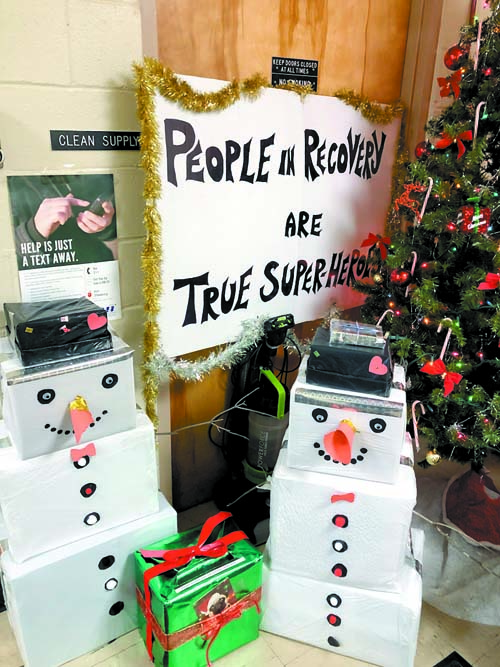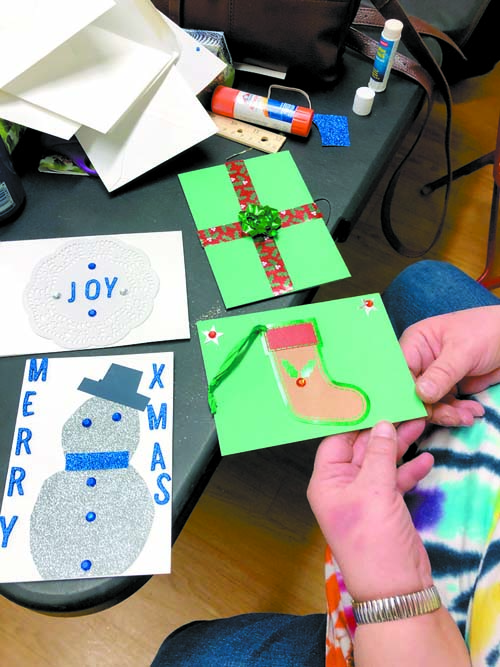Recovery Center a lifeline during holidays

By Dawn De Busk
Staff Writer
“Silent Night” is a beautiful song.
But, for somebody in recovery, spending time isolated away from others, especially during the holidays, can be anything but a beautiful experience.
It takes strength and determination — or sheer desperation — to reach out and ask for help.
The staff at Lakes Region Community Center (LRCC) is there in person at the drop-in center or there as an understanding voice over the phone via the hotline number. The people on staff — some of whom have struggled with addiction during their lifetime — are there as a lifeline for other people.
“We care for everybody who walks through that door,” said Executive Director Tracey Martin, “because we know how much it takes to leave the house, to wrestle with thoughts of fear and anxiety, to get into the car and drive here, and to get out of the car and walk through the door and meet people you’ve never met before.”
“We care for everyone who walks through our door. We know it took a lot of courage to do that,” said Martin, who is a recovery coach and Trainer of Trainers (TOT).
The center is located at 25 Hospital Drive in Bridgton. The entrance is behind all the buildings on the hospital campus. The entrance is where the United Ambulances are parked. The phone number is (207) 803-8707.

LRRC President Catherine Clough-Bell is a Licensed Alcohol and Drug Counselor (LADC) and a Certified Clinical Supervisor (CCS).
Both Clough-Bell and Martin agree that sobriety is filled with moments that are difficult. The desire to not use or not drink, the desire to stay clean and sober, often requires getting out of one’s comfort zone.
“Just walking through the door, spending 10 or 15 minutes talking with a staff member and talking about nothing but the weather, that is 10 or 15 minutes that a person is still alive. Their addiction isn’t killing them in those moments,” Clough-Bell said.
“Talk to someone about it. Don’t go it alone because it’s life or death. If you think about the statistics specific to opioids: Somebody who begins using heroin or is a heroin user, they have a 50 percent chance of dying. When using heroin, it is 50-50 chance whether you live or die,” Clough-Bell said.
For alcoholics, too, it is a life or death situation because taking that first drink can lead to a chain of events that result in worsening health issues, blacking out, drunk driving or any number of scenarios.
The best bet for recovery is to not keep silent. Talk to someone. The biggest gift a person in recovery can give herself or himself is: to reach out to other human beings who can become a sober support system.
“You don’t have to go it alone. If there was any message I would want to get across it’s that: You don’t have to go it alone,” Martin said.
Clough-Bell agreed.
“The opposite of addiction is connecting,” she said.
“The opposite of addiction is connection. As a society, when a person is using drugs and alcohol and acting in a way we don’t like, we push them away, which only perpetuates the stigma, the shame, the desire to continue using,” she said. “That connection could be what helps a person move into recovery.”
Martin explained, “So many times people are isolated and disconnected because they feel so much shame and guilt. They don’t have to feel that here.”
In the world of recovery, the holidays that include Thanksgiving, Christmas and New Years’ are notoriously known as a difficult time for sobriety.
“The holidays can be very difficult for people in recovery,” Martin said. “We added a topic to the Tuesday night group. We focus on triggers and coping skills during the holidays whether it is around use, holiday parties, around family and friends.”
Clough-Bell spoke on the reasons why the holidays can be a trying time.
“The holidays can be difficult because people in recovery may have family that doesn’t understand their recovery or doesn’t believe in their recovery. Or, they are still drinking and/or using substances,” Clough-Bell said. “We think that the holidays are suppose to be the times that everybody is suppose to be festive, happy and hopeful.”
Those expectations can lead to feeling let down. Another expectation is that holidays are a time to be around family.
“The holidays can be hard because some people cannot contact families, cannot fix the relationship. The family could have their own substance abuse issues,” Martin aid.
Clough-Bell said, “Or they make the decision to not be around family because it is not healthy.”
“There could be negative talk like, ‘Why can’t you suck it up? Why can’t you be like everybody else? Why do you think you are better than everyone else?’ It can be difficult,” she said.
“Many of our people who have depression and anxiety, this is the time of year it is much more prominent. There is less daylight. The holidays compound the severity of that,” she said.
LRRC staff understands the importance of getting out of the old routine and making new, healthy social connections with other people in sobriety.
In addition to a calendar full of recovery groups at the center, there is an arts-and-crafts hour every Friday, from 1 to 4 p.m.
Martin said the crafts serve many purposes: socializing, networking, building self-confidence by completing a project, staying busy instead of using, and engaging in a healthy activity that celebrates the season.
“You are interacting with people. You are doing something fun and you get to meet people,” Martin said.
“You are developing a sober support network, and engaging your brain in a different way. You are making new pathways by utilizing your creativity that you haven’t used in a long time because you were using drugs and alcohol,” Clough-Bell said.

